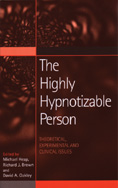5. Hypnosis and Will
Written on Nov 11, 2025
Can a hypnotist make people commit dangerous, immoral and illegal acts?
In the public mind (and I include here lawyers and the police) there is a common belief that hypnosis can induce automatism or absolute obedience to the will of the hypnotist. In fact, hypnosis is often referenced along with occult practices that allegedly induce 'trance' states whereby the affected person may appear 'zombified'. Stage hypnosis (see previous post) is another reason why people may associate hypnosis with automatism.
From a modern theoretical perspective, it is difficult to make the case that hyper-obedience is a property of hypnosis, even in highly hypnotisable people, although some dissociative models might accommodate this. As I said in previous posts, academic definitions of hypnosis usually describe the subject's responding to suggestion as having an automatic and involuntary quality. However, this is not the same as extreme obedience; I might say to you that your right arm is feeling so light that it will start to rise from your lap, but this is a suggestion, aimed at creating a certain experience for you, and a positive response should feel very real and effortless. On the other hand, if I say to you, 'Lift your right arm, this is a command or instruction, not a suggestion, and would be experienced as a such. Likewise 'stand up', 'sit down', 'quack like a duck', etc.
And yet, did I not say in my previous post on stage hypnosis that many participants feel they are under the complete control of the hypnotist? Where does this hyper-obedience come from, if not from hypnosis?
Let's address this question by moving to another context: the psychological laboratory. In the 1960s and 1970s experiments were conducted to establish whether hypnosis has the property to render susceptible individuals so submissive that they would obey instructions to engage in seemingly dangerous and antisocial behaviour, such as making slanderous statements, plunging their hands in a beaker containing acid and throwing 'acid' at the experimenter, mutilating the bible, cutting up the national flag, making homosexual advances, stealing, and dealing in heroin. And yes, a significant number of hypnotic subjects were compliant in these experiments.
I should say that I don't think these were very good experiments (perhaps partly because they were ethically challenging for the researchers). They have also been misrepresented in some quarters as demonstrating that hypnosis may override a person's will and make them do things they would normally refuse to do on the grounds that they are illegal, immoral or unethical.
Not so. A second finding of these studies was that hypnotically insusceptible subjects who were simply asked to pretend that they were hypnotised were equally likely to obey the experimenter's instructions. So, hypnosis itself appeared to make no difference.
Now, without having read these learned papers (which are difficult to access), some hypnotists I have come across insist that hypnosis can override the will of the subject, claiming that investigators who deny this are not sufficiently competent as hypnotists, whereas they are, and they can render their subjects hyper-obedient. But these people are missing the point. The studies reveal that hypnotic subjects in the laboratory can be induced to commit dangerous and antisocial behaviour acts, but their extreme degree of compliance is because they have volunteered to take part in a scientific experiment and are strongly motivated to comply with the experimenter's instructions, just like non-hypnotic subjects.
The high degree of compliance of participants in psychological experiments is in fact a well-known phenomenon, as revealed in the famous experiments of the social psychologist Stanley Milgram over 60 years ago (and since replicated). These demonstrated that, on the understanding that they were participating in a scientific experiment, members of the public could be persuaded, ostensibly, to deliver painful and even potentially lethal electric shocks to another person.
So we may conclude that no convincing evidence has emerged to indicate that hypnotic subjects are more likely to obey instructions than control subjects who are subjected to the same demands and pressures.
At least in the laboratory. What about stage hypnosis, likewise the very occasional claims by defendants that they were compelled to commit a criminal act under the influence of hypnosis? Let's pause now to give some thought to these contexts.
Note: At present, it's not possible for you to post your comments on my blog directly. But I welcome them via my email address, and I'll only upload them under 'Comments' if that is your wish (and with the usual stipulations about offensiveness, etc.)




